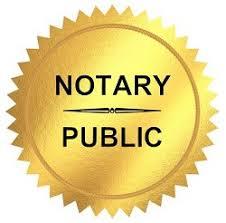Demystifying Notarial Work: Streamlining the Duty and Value of Notaries
Their role, frequently shrouded in enigma for several, brings considerable weight in making certain the legitimacy and honesty of important files. By deciphering the complexities bordering notarial methods and dropping light on the relevance of their acts, a more clear understanding arises of the important role notaries play in upholding the textile of lawful and legal agreements.
The Background of Notarial Job
Just how did notarial work progress over time to become an important component of legal and organization deals? The history of notarial job dates back to old people, where scribes played an essential role in videotaping essential info and authenticating papers. As societies proceeded, the need for a more formalized system to make sure the credibility of arrangements emerged. This brought about the growth of notaries, people appointed by the state to function as objective witnesses in legal matters.
During the Middle Ages, notaries gained importance in Europe, with their features increasing to consist of preparing lawful files, licensing signatures, and maintaining documents. The surge of international trade additionally emphasized the value of notarial job in verifying contracts and contracts across boundaries.
In the modern period, notaries remain to play an important role in lawful and service deals by validating identities, confirming the authenticity of papers, and preventing fraud. Their role in certifying the credibility of contracts adds a layer of safety and trust fund to the ever-evolving landscape of business and regulation.

Duties and Responsibilities of Notaries
The historical advancement of notarial job from ancient worlds to the contemporary age has actually shaped the distinctive obligations and duties that notaries promote in lawful and company transactions today. Notaries play an essential function in verifying the authenticity of papers and the identity of signatories. Among their main duties is to witness the signing of crucial files, such as deeds, wills, and agreements, to make certain that all celebrations are getting in right into contracts knowingly and voluntarily. Notaries likewise verify that notaries are of sound mind and not under pressure or threat.
They license duplicates of original papers, supplying assurance to institutions that the copies are true replicas of the originals. On the whole, the responsibilities and duties of notaries are vital in safeguarding the stability and validity of numerous files and transactions - Conveyancer.
Notarial Certificates and Signatures
Exhibiting thorough interest to information, notarial certifications and signatures act as important elements in validating the authenticity of legal files. Notarial certifications typically include essential info such as the date of registration, the names of the signatures, a description of the document, and the notary's main seal. These certificates offer a clear record of the notarial act, making certain that the file can be conveniently determined and traced back to the notary who supervised the process.
Trademarks play a crucial function in notarial work, as they signify the arrangement and consent of the parties involved. Notaries meticulously witness the signing of files to verify the identity of the signatures and verify that they are signing of their very own free choice. By affixing their main seal and signature to the record, notaries certify that the essential treatments have been complied with which the record is enforceable and legitimate.
Fundamentally, notarial certifications and trademarks are the characteristic of authenticity in legal purchases, giving assurance to all parties entailed that the files are reputable and binding.
Significance of Notarial Acts

Registration Refine Described
Explaining the notarization process offers clarity on the crucial actions associated with validating lawful papers. The registration process commonly begins with the private providing the paper to a notary public. The notary then validates the endorser's identity through acceptable identification techniques. When the identity is validated, the notary ensures that the specific authorizing the file does so voluntarily and with no YOURURL.com coercion.

Final Thought

Notarial certifications normally contain important details such as the date of registration, the names of the signatories, a description of the file, and the notary's official seal. These certificates provide a clear document of the notarial act, ensuring that the record can be easily identified and traced back to the notary who supervised the process.
By fastening their official seal and signature to the file, notaries license that the essential treatments have actually been adhered to and that the file is enforceable and valid.
By confirming the identity of the signatories, verifying their desire to get in right into the contract, and certifying the day and area of the finalizing, notaries play a critical duty in maintaining the credibility of lawful papers.After the paper is authorized, the notary will affix their main seal or stamp onto the file.